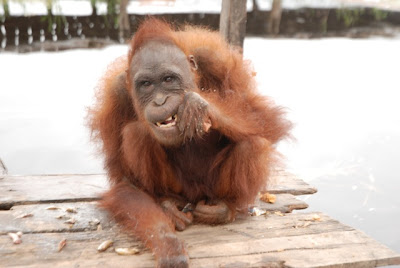A MORE REALISTIC FIGURE WOULD PROBABLY BE
2% OR LESS.
-------------------------------------------
Indigenous people get ‘20%’ REDD money
Adianto P. Simamora , The Jakarta Post | Fri, 01/29/2010
At least 20 percent of revenue from the forest carbon scheme should be transferred to indigenous people who play crucial roles in protecting the forest to avoid emission leakages, a minister said.
State Environment Minister Gusti Muhammad Hatta said that much revenue from the carbon trade was needed to ensure the sustainability of emission reduction in tackling climate change.
“Giving indigenous people a fair share also acknowledges their rights,” Gusti said.
He said the government could not leave the indigenous people behind in projects relating to the forest as they were at the forefront of environmental preservation.
Gusti said that indigenous people had great knowledge about how to protect the forest.
“The traditional people have long been conscious of the environment. It is important to include them in reducing emissions from deforestation and forest degradation [REDD] projects,” he added.
REDD was expected to be an alternative to emission cuts from forests, which contributed about 20 percent to global emissions.
Under the scheme, countries that protect their forests can receive financial incentives through the carbon trade from rich nations.
However, debates on land and forest rights have been a hot topic at both national and international levels, mainly concerning efforts to mitigate global warming.
Activists said the unclear status of indigenous people and tribal communities managing forests would hamper the implementation of REDD programs.
The State Ministry for the Environment signed a memorandum of understanding with the Alliance of Archipelagic Indigenous People (AMAN) on environmental protection on Wednesday.
Gusti also inaugurated 35 indigenous people, also AMAN members, as the country’s ambassadors in protecting the environment.
AMAN secretary-general Abdon Nababan welcomed Gusti’s statement. “But our main concern is not on the percentage of revenue. We want the government to acknowledge the rights of indigenous people,” Abdon told The Jakarta Post.
There are currently 1,163 tribal communities in AMAN.
AMAN claimed that of Indonesia’s 210 million population, between 50 million and 70 million were part of customary communities earning their livelihood from forests.
Abdon said that the government continued to ignore communal rights by allowing natural resources of customary land and forests to be exploited.
Gusti said that about 20 percent of money from REDD projects should also be allocated to local administrations that controlled the forests.
“The remaining expected revenue from forest carbon trade will be for investors.
“Ten percent will go to the central government,” he said. The REDD scheme was expected to take effect in 2013






























































-a.jpg)








